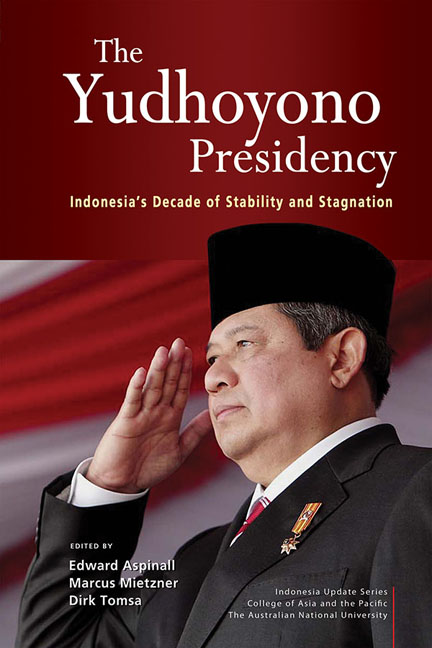Book contents
- Frontmatter
- Contents
- Tables and figures
- Contributors
- Acknowledgments
- Glossary
- 1 The moderating president: Yudhoyono's decade in power
- 2 Prologue Yudhoyono's legacy: an insider's view
- PART 1 PERSONAL, COMPARATIVE AND INTERNATIONAL PERSPECTIVES
- 3 The politics of Yudhoyono: majoritarian democracy, insecurity and vanity
- 4 Men on horseback and their droppings: Yudhoyono's presidency and legacies in comparative regional perspective
- 5 Yudhoyono's foreign policy: is Indonesia a rising power?
- PART 2 INSTITUTIONS, POLITICS AND SECURITY
- PART 3 GENDER, HUMAN RIGHTS AND ENVIRONMENT
- PART 4 THE ECONOMY AND SOCIAL POLICIES
- Index
- Miscellaneous Endmatter
3 - The politics of Yudhoyono: majoritarian democracy, insecurity and vanity
from PART 1 PERSONAL, COMPARATIVE AND INTERNATIONAL PERSPECTIVES
Published online by Cambridge University Press: 19 May 2017
- Frontmatter
- Contents
- Tables and figures
- Contributors
- Acknowledgments
- Glossary
- 1 The moderating president: Yudhoyono's decade in power
- 2 Prologue Yudhoyono's legacy: an insider's view
- PART 1 PERSONAL, COMPARATIVE AND INTERNATIONAL PERSPECTIVES
- 3 The politics of Yudhoyono: majoritarian democracy, insecurity and vanity
- 4 Men on horseback and their droppings: Yudhoyono's presidency and legacies in comparative regional perspective
- 5 Yudhoyono's foreign policy: is Indonesia a rising power?
- PART 2 INSTITUTIONS, POLITICS AND SECURITY
- PART 3 GENDER, HUMAN RIGHTS AND ENVIRONMENT
- PART 4 THE ECONOMY AND SOCIAL POLICIES
- Index
- Miscellaneous Endmatter
Summary
In the twilight of his presidency, Susilo Bambang Yudhoyono spoke reflectively to his personal staff about his place in Indonesian history and on the world stage. He saw himself as holding the exalted position of one of his nation's great presidents, if not the greatest. Moreover, he was convinced that he bore comparison with other leading contemporary international figures, such as Barack Obama, Tony Blair, David Cameron and Angela Merkel. He saw these leaders as peers because, like them, he had not only had a major impact on his own country but also become a significant player in global affairs.
Yudhoyono's lofty opinion of his own attainments stands in contrast to the widespread opinion of scholars and political commentators that he was a good, but not a great, president (Bachelard 2014; Howes and Davies 2014). His achievements have often been referred to and it is only necessary to refer briefly to them here. He is credited with stabilising and consolidating democracy in Indonesia; facilitating the fight against corruption; overseeing the peace process in Aceh; providing policies that led to high economic growth; and supporting law enforcement agencies in their counterterrorism operations.
Arguably, the principal reason that Yudhoyono was not a better president was that he was too hesitant and indecisive—in a position that required the very opposite of these traits. One of the most common terms used by Yudhoyono's detractors to describe him was ‘peragu’, a waverer or doubt-ridden person. And indeed, he lacked the gumption to take bold decisions that is the mark of a great leader. A vivid early illustration of Yudhoyono's indecisiveness comes from 2002 when, as coordinating minister for political and security affairs in Megawati Sukarnoputri's government, he was tasked with overseeing peace negotiations with the Free Aceh Movement (Gerakan Aceh Merdeka, GAM). A senior diplomat on the Indonesian negotiating team recalled that the initial discussions with Yudhoyono went well: ‘We presented him with a quite complex brief but were surprised at how quickly he grasped the details. He was very impressive intellectually’. The problems began, however, when the team asked for guidance on their negotiating position. Yudhoyono requested a succession of option papers over the following weeks but repeatedly failed to give instructions. Matters came to a head as the negotiators were about to depart for meetings with GAM in Geneva.
- Type
- Chapter
- Information
- The Yudhoyono PresidencyIndonesia's Decade of Stability and Stagnation, pp. 35 - 54Publisher: ISEAS–Yusof Ishak InstitutePrint publication year: 2015



